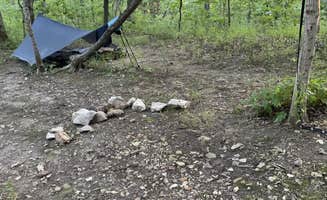Best Primitive & Dispersed Camping near St. Charles, MO
Dispersed camping near St. Charles, Missouri primarily centers around two free primitive sites. Lone Spring Trail Backpacking Campsite provides backcountry camping accessed via drive-in entry points, while Silo Access Area (also known as O'Neil Creek) offers riverfront camping along the Mississippi. Both locations operate as no-fee primitive camping areas without designated sites or hookups. These areas represent the limited dispersed camping options in the region, with campers permitted to set up tents in undeveloped locations rather than at established campgrounds. For true wilderness enthusiasts, these free dispersed campsites near St. Charles provide an authentic backcountry experience with minimal development and maximum solitude.
Access to Silo Access Area requires driving on gravel roads to reach the riverbank location. The area has undergone some improvements with a freshly paved area and a boat ramp, though the entrance road remains basic. No drinking water is available at either location, requiring campers to bring all necessary supplies. Neither site offers electric hookups or other amenities beyond basic pit toilets at Silo Access Area. Fires are permitted at both locations, though campers should bring their own firewood and practice proper fire safety, especially at the riverside location where conditions may vary seasonally.
The Mississippi River location provides a distinctive camping experience with unique riverfront views. "This site is a great place to watch that amazing river pass by. You sit and watch the barges and various things float by," noted one camper who visited Silo Access Area. The location's proximity to active train tracks means occasional noise disruption, with another visitor mentioning, "You won't miss the train as it comes by 3-4 times a day." Lone Spring Trail offers a more secluded forest experience with dedicated areas for tent setup and a metal fire pit. The area is undergoing reforestation efforts, providing a mix of open areas and tree cover. Wildlife viewing opportunities exist at both locations, though mosquitoes are reported to be prevalent at the riverside camping area.



